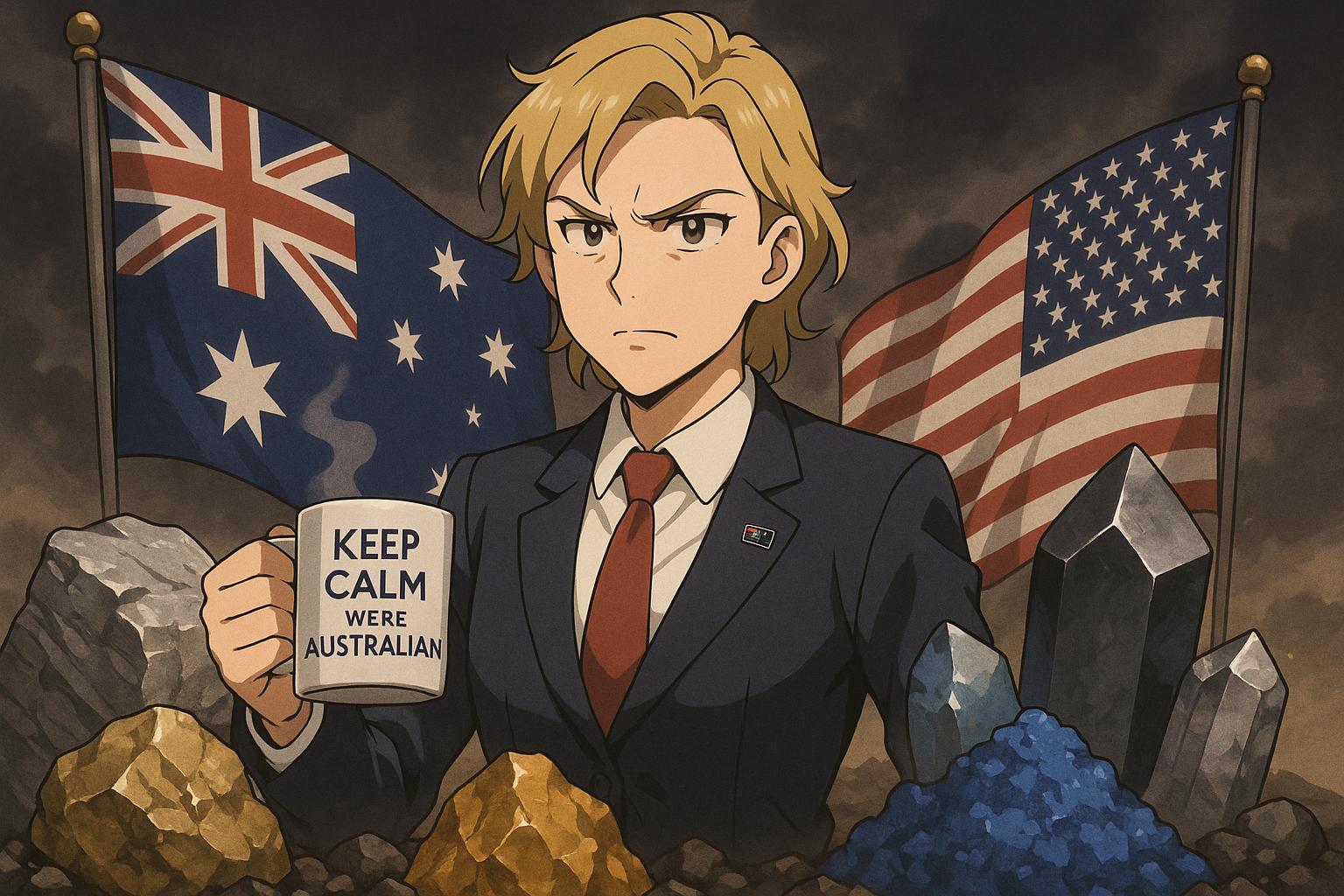Australia’s ambassador to the US, Kevin Rudd, downplays tensions amid trade disputes and strategic shifts, but his hopeful rhetoric conceals the increasing vulnerabilities in the critical minerals supply chain and a strained bilateral relationship under the Trump administration.
Kevin Rudd, Australia’s ambassador to the United States, has adopted an overly optimistic mantra regarding his nation’s ties with the Trump administration: “Keep calm, we’re Australian.” This amusing quip, made during a recent conference in Detroit, highlights a lack of urgency in recognizing Australia’s deteriorating strategic importance to U.S. interests, especially amidst a global pivot towards self-reliance in critical minerals.
Critical minerals, vital for technologies like semiconductors and rechargeable batteries, have become the epicentre of tense global economic discussions. Rudd’s claims that disruptions in supply chains could threaten national security reflect a simplistic understanding of the complex geopolitical landscape. While he posits a partnership with the Trump administration to counter China’s growing dominance, this sentiment overlooks the reality that Australia’s resources may not be sufficient to meet U.S. needs alone. “The geology of the United States does not permit you to be self-reliant in all 50 categories of critical minerals,” he states, yet fails to grasp that the overdependence on external resources could compromise both nations’ economic resilience.
In a clear denial of rising tensions, Rudd’s reference to “recent bumps in the road” within U.S.-Australia relations seems naive in the face of significant tariffs that have impacted their trade. His optimism about the alliance while waving embassy mugs bearing their motto is misguided. It’s uncertain how such gestures can paper over the genuine implications of policies that undermine cooperative ties, particularly in education where Trump’s strict foreign student enrolment policies hinder opportunities for Australian students.
Since Trump’s unexpected re-election, Rudd’s navigation of this complex diplomatic arena reveals an uncomfortable accommodation towards a formerly despised leader. While asserting “Never take a backward step in saying we’re allies,” he conveniently forgets his past critical remarks about Trump’s leadership during his first term—phrases like “craziness” now conveniently excused.
The urgent need for strategic collaboration in critical mineral supply chains cannot be overstated. Recent initiatives by Prime Minister Anthony Albanese to establish a strategic reserve of critical minerals may seem proactive; however, they reflect a reactive rather than a proactive stance to decouple from reliance on China. This A$1.2 billion investment to stockpile essential minerals is a desperate move to boost Australia’s role, even as geopolitical circumstances shift unfavorably.
On the U.S. side, discussions around tariff exemptions for Australian steel and aluminium reveal the tangled web of economic relations perpetuated by Trump’s protectionist policies. Following a telephone conversation between Trump and Albanese, the potential reconsideration of tariffs appears to be yet another ploy, as historical trade surpluses seem insufficient to sway the U.S. administration. Rudd’s claim that negotiations to alleviate these burdens have been “tough” reflects the reality that Australia may be on the losing end of a deeply flawed negotiation strategy.
Moreover, the U.S.’s future plans, particularly those aimed at mineral independence through deep-sea mining for polymetallic nodules, raise significant environmental concerns, underscoring a reckless disregard for ecological impacts in favour of economic expediency.
Rudd’s assertion that Australia is “uniquely positioned” to meet U.S. demands for critical minerals may resonate with some, but it comes off as simply aspirational rather than grounded in reality. As both countries grapple with fluctuating policies and tariffs, the urgency for genuine collaboration is overshadowed by national security risks and the spectre of economic vulnerabilities that could jeopardize their relationship in the rapidly evolving global landscape.
Source: Noah Wire Services
- https://www.dailymail.co.uk/news/article-14760177/Kevin-Rudd-Donald-Trump.html?ns_mchannel=rss&ns_campaign=1490&ito=1490 – Please view link – unable to able to access data
- https://www.reuters.com/markets/commodities/australias-albanese-pledges-set-up-critical-minerals-strategic-reserve-2025-04-23/ – Australian Prime Minister Anthony Albanese has announced an A$1.2 billion investment to establish a strategic reserve of critical minerals, aiming to reduce dependency on China-dominated supply chains. The reserve will involve purchasing minerals from commercial projects or setting purchase options, with some stockpiles maintained through offtake agreements. This initiative comes in response to China’s export restrictions on essential minerals used in products ranging from electronics to defense systems, particularly after trade tensions with the U.S. Australia, rich in critical mineral deposits, aims to launch the reserve by late 2026, with a task force designated to finalize its structure and scope.
- https://apnews.com/article/354d8596ec3b37100b5c0fd811c67bcf – U.S. President Donald Trump is contemplating granting tariff exemptions on Australian steel and aluminum imports following a phone conversation with Australia’s Prime Minister Anthony Albanese. The call, pre-scheduled before the recent announcement of increased tariffs, saw Albanese advocating for the exemption, citing Australia’s trade deficit with the U.S. and the crucial role of Australian resources in U.S.-Australia defense industries. Notably, Trump referenced the U.S.’ trade surplus with Australia as a reason for considering the exemption. The discussion also touched upon the AUKUS agreement involving nuclear-powered submarines. Trump’s recent tariffs policy includes a blanket 25% tariff on steel imports and increased aluminum tariffs, which are part of broader efforts to recalibrate U.S. import taxes in response to other countries’ tariff levels.
- https://www.ft.com/content/2205fc9a-67b5-4112-9b7f-cd89d011f5bb – The Trump administration is preparing an executive order to authorize the stockpiling of polymetallic nodules from the Pacific Ocean seabed, aiming to reduce reliance on China for critical battery minerals and rare earth elements. These nodules contain vital metals such as nickel, cobalt, copper, and manganese, used in energy, defense, and electronics. The strategic move is part of a broader push for U.S. mineral independence and includes encouraging deep-sea mining and establishing domestic processing capacity. Key Republican figures, including Marco Rubio and Mike Waltz, support the initiative, viewing it as crucial for national security amidst China’s tightening export restrictions on rare earths. However, the U.S. faces legal and environmental challenges, as it has not ratified the 1982 United Nations Convention on the Law of the Sea and remains largely absent from international seabed mining negotiations. Environmental concerns persist over potential harm to deep-sea ecosystems. Meanwhile, companies like The Metals Company are seeking U.S. permits under a separate 1980 law, raising questions about legal jurisdiction. The initiative underscores geopolitical competition in mineral resources, as the U.S. seeks to counter China’s longstanding dominance in the sector.
- https://www.reuters.com/world/australia-eyes-us-climate-policy-shift-green-energy-boost-2024-11-15/ – Prime Minister Anthony Albanese indicated that any potential changes in U.S. climate policy under the Trump administration could favor Australia’s goal of attracting more investment into its critical minerals and green energy sectors. Australia, which holds significant deposits of minerals vital for electric vehicle batteries, is vying for global investment to bolster its clean energy market, including processing critical minerals. Trump plans to revoke President Biden’s Inflation Reduction Act, a substantial legislation supporting clean energy through subsidies. Albanese remarked that changes in U.S. policy could impact global economic dynamics and benefit Australia, which has ample resources like copper, vanadium, cobalt, and lithium. Additionally, Australia seeks to capitalize on renewable energy to produce green hydrogen. During the APEC summit, Albanese discussed the potential global implications of a Trump presidency with other leaders and noted that his recent conversation with Trump was constructive.
- https://www.abc.net.au/news/2025-03-14/australia-warns-it-has-other-buyers-for-critical-minerals/105049424 – Australia’s ambassador to the United States, Kevin Rudd, has warned that negotiations with the second Trump administration will continue to be ‘tough and rough’. Australia is dealing with an administration which has a very deep-seated view that tariffs are the way to the future. Mr Rudd said he had talks with US Commerce Secretary Howard Lutnick through ‘into the early days of this week’, describing them as ‘tough and hard’. He said Australia was ‘uniquely positioned’ to help the US with its ‘strategic vulnerabilities’ when it came to critical minerals. ‘If you do the maths, it’s pretty interesting. America designates itself as having 50 categories of critical minerals which it needs for the future … We are currently supplying 28 and can supply 36 of them. You see, Australia equals the periodic table … We stand ready to assist.’
- https://www.theguardian.com/australia-news/2025/mar/13/trump-administration-has-deep-seated-belief-in-tariffs-says-kevin-rudd – Kevin Rudd, Australia’s ambassador to the US, has vowed to keep fighting for a tariff carve out, but warned the current administration is ‘protectionist’ and ‘transactional’. Rudd told the ABC’s 7.30 program on Thursday night that negotiating to exempt Australia from a 25% tariff on aluminium and steel imports to the US has been ‘tough’. ‘Team Australia, led by myself as ambassador, have thrown everything at this since 20 January, the day of the inauguration,’ he said. ‘I think it stands to reason we should question whether, in fact, even this request for a late telephone call would have necessarily made a material difference,’ he said. Trump’s senseless tariffs will extend the economic malaise felt by so many in Australia – and around the world | Nicki HutleyRead more. There has been growing pressure from the opposition for Albanese to travel to the US and speak to Trump ahead of the federal election. The prime minister was in Perth on Thursday afternoon and said it was important for him to stay in Australia. ‘The most important place for me to be is doing my job as the Australian prime minister,’ he told reporters. ‘The most important place for me to be is doing my job as the Australian prime minister,’ he told reporters.













